Bakuichi-uchi (Gambling House, 1967) launched a series from Toei Studios starring Koji Tsuruta as the quintessential chivalrous gambler. This series embraces some of Tsuruta's best work for the genre. My love of yakuza-eiga really boils down to films like these, films which have kokuro or heart, ninkyo or gallantry, & which lament the world's cruelty & violence such as cannot be avoided.
Regarding the resigned, deadpan, or clinically depressed expression worn by Tsuruta in these & similar yakuaz films, film essayist Tadao Sato observed, "The expression of resignation seems to be a trait of men who have given up more sophisticated forms of communication, chosing to assume, instead, the stern, ostentatious pose of one who is prepared to die at any time. This death resolve adds a streak of beauty to the gory swordfight climax, with the fight becoming its ultimate expression."
Tadao's observation may help the unitiated understand how such a film genre could ever have been so popular, a genre for which "beauty" is blood-splattered & "good" men live outside the law & can for the sake of compassion just plow into a gangster headquarters & start killing everyone who's a scoundrel.
The theme of one man alone confronting authority & injustice & setting things right by killing everyone who is hurtful, well, such a man is not, in the real world, heroic. And later yakuza films would increasingly acknowledge that such men are sociopaths, not good men strong decent fellows who have no options other than mass murder.
Were that a reality it wouldn't be so great. But the fantasy of it is wonderful, not merely the fantasy of being able to kill lots of people but the fantasy of one's own pain & suffering & loneliness having purpose; the fantasy that one person of noble disposition & serious demeanor & a strong sword-arm can make a difference in a world of tragedies; even the fantasy that there could be someone out there who sees our pain & would put his life on the line in order to kill just about everyone who ever meant to do us harm.
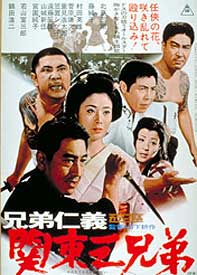 Number 5 in the series is Bakuchi-uchi: Nagurikomi (Gambling House: The Raid, 1968), one of the best of the set of ten feature films. Set in the 1930s, it opens with a classic yakuza-eiga sequence of male bonding. Koji Tsuruta as Kou Koarashi is sitting inside a noodle vendor's booth next to an older man who introduces himself as Kichi the wolf (Daisuke Kato), once a famous gambler but getting on in years. Number 5 in the series is Bakuchi-uchi: Nagurikomi (Gambling House: The Raid, 1968), one of the best of the set of ten feature films. Set in the 1930s, it opens with a classic yakuza-eiga sequence of male bonding. Koji Tsuruta as Kou Koarashi is sitting inside a noodle vendor's booth next to an older man who introduces himself as Kichi the wolf (Daisuke Kato), once a famous gambler but getting on in years.
They like each other & Kichi says, "We're loners. I'll erect your tomb if you die. Will you do the same for me?"
Soonafter (still before the film's credits begin) Koarashi & old Kichi make a raid together, an intense battle with tanto knives against an enemy gang. Kichi is injured on the forehead & will afterward have lost partial vision. But at least they escape & Koarashi leaves Kichi at a doctor's house & takes sole blame for the raid, going to prison & becoming famous in the gambler's world.
After this spectacular series of shots establishing the male bonding, the heroism, & the violence, the credits for the film begin, after which the story picks up five years later when Koarashi is being released from prison.
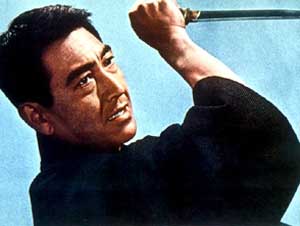 As classic yakuza set-pieces unfold one after another, we learn that Boss Yajima, who has benefited greatly because of Koarashi's violent service five years earlier, has become an important mobster in league with a corrupt godfather named Kanai, head of all Kanto gamblers. As classic yakuza set-pieces unfold one after another, we learn that Boss Yajima, who has benefited greatly because of Koarashi's violent service five years earlier, has become an important mobster in league with a corrupt godfather named Kanai, head of all Kanto gamblers.
Yajima has no idea what became of Kichi the Wolf, despite having misled Koarashi into believing the old man would be taken care of. Koarashi declines membership in Yajima's outfit, but goes in search of Kichi the Wolf, to whom he feels he owes his life & fame.
Scene after scene shows us this chivalrous gambler's modesty & self-effacement, perhaps his self-hatred, though admired by other men. He finds Kichi working as a gambling house dicer in a village, using an assumed name. He seems angry at Koarashi, who accepts rebuff after rebuff because of his own self-hate, though once, with sorrow in his eyes, he says, "What a thing to say to your old buddy."
Koarashi is involved with a woman who is indebted to the village's bordello. "I like you even if you don't like me," he says, but soon she likes him rather a lot. Later he learns Kichi's secret: This woman is his daughter, who he is taking care of as a shadowy patron, never admitting to her who he is. Near the climax he is killed in a failed, pitifully attempted raid on evil gangsters, & dies in his daughter's arms, confessing his identity while she wails.
While the story is unfolding we also learn that an evil construction boss wants to muscle in on gambling territory. His name is Ishi (Tatsuo Endo, who plays evil gangster bosses habitually). He has been buying off Kanai, the head of all Kanto gamblers. Ishi perpetrates numerous crimes against the district oyabun or gambling boss Kido, an honorable gambler of the old type, who by his nature reinforces one of the chief myths of ninkyo-eiga or chivalrous gangster films, that certain sorts of yakuza are noble & good.
Ishi's brother Tasaburo (Kyosuke Machida, usually a minor hero but a major villain here) is a veteran of the Manchurian campaign & expert in exposives & with pistol. He creates a situation forcing a war between the Ishi gang & the Kidos. But Kaorashi intervenes, saying he will find an intermediary to end the trouble peacerdfully.
As Kaorashi is owed a big favor by boss Yajima, he goes to Tokyo to ask Yajima to arrange a meeting with the big boss Kanai of Kanto. Kanai seemingly agrees to intermediate the situation.
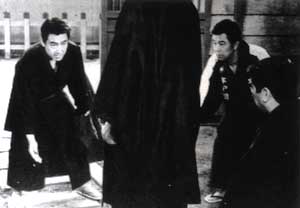 Koarashi believes in the gambling codes & has faith ins his superiors having a similiar devotion to the code. The rule is to protect the yakuza world from outside interference. The Ishi gang, construction workers, are ironically "decent citizens" according to the yakuza cold, with whom gamblers aren't supposed to interfer, & vice-versa. But Kanai secretly sides with the construction boss, using the highly formal reconciliation ceremony to sell out the Kido gang & give the district over to the Ishis. Koarashi believes in the gambling codes & has faith ins his superiors having a similiar devotion to the code. The rule is to protect the yakuza world from outside interference. The Ishi gang, construction workers, are ironically "decent citizens" according to the yakuza cold, with whom gamblers aren't supposed to interfer, & vice-versa. But Kanai secretly sides with the construction boss, using the highly formal reconciliation ceremony to sell out the Kido gang & give the district over to the Ishis.
Koarashi tries to stop the proceedings, understanding his error in trusting Yajima & Kanai, but the trap is too perfect. Afterward, Koarashi says, "I'm not satisfied yet." But Kanai calls him, "Stray dog!" & says, "Don't act important because you're famous!"
Often in such films there are two heros in the final raid, but Koarashi is famed as a loner, the irony being that he was not alone on the earlier raid which made him famous & caused Kishi the Wolf to partially lose his sight, never recognized for his part. The good boss's right hand man Egawa should not be involved because the reconciliation pact cannot be gone against. Only Kaorashi, as a "stray dog," is free to act, to purge the system of corruption without adversely affecting the Kido position.
So in the "march" to the Ishi headquarters, he is alone, while a yakuza folksong about the loner's bravery is sung in the background by one of the film's other actors.
The raid is typically protracted, a series of duels with knives, the various villains being killed one by one, & bit players slaughtered willynilly for extra thrills. "I'm a stray dog all right!" he exclaims. "I'll show you how a real gambler fights!"
The gunman Tasaburo cannot shoot the raider because Ishi is being held as shield. But Kanai offers Tasaburo the territory if he will shoot both men. Tasaburo kills his own brother but is slain by Koarashi as the shield drops dead, & Kanai dies in the next stroke of the knife, pleading uselessly for mercy.
Several things which often happen in yakuza films do not happen in this one. Kichi the Wolf almost cuts off his little finger in the ultimate act of apology, but is stopped. Boss Kido is stabbed by Ishi men, but does not die, though good bosses are so often killed before a hero acts. There is more often than not two men on the final raid, but Koarashi acts alone. And the hero is usually hauled off to prison if he survives, but in this case there is no evidence that Koarashi will be caught. His only punishment is unmitigated sadness & loneliness.
Tama, by now bought out of thrall to the bordello, is now able to live a normal life, & a happy ending for our hero & his girlfriend should be possible. But to be a yakuza is to be a living curse, & no chivalrous gambler would inflict himself on decent folk. Tama is informed, "I told you a gambler has no heart. Live in this village & look after your dad's grave." Then Koarashi walks off into a cold night. He lingers on a bridge, sticking his knife into the railing, old Kichi's knife beside it. It's a virtual shrine, as promised, & he says to the ghost of the old man, "Good-bye, pop."
Gambling House: The Raid has poker-faced tragedy oozing from every frame. Tragedy & sorrow are the essence of classical ninkyo-eiga. Heroism, vengeance, bloody raids & duels . . . these are not to the glory of the men who fight, but to their everlasting sadness.
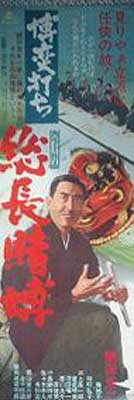 Here is appended the whole series in order of release: Here is appended the whole series in order of release:
1. Bakuchi-uchi. 1967
2. Bakuchi-uchi: Ippiki-ryu. 1967
3. Bakuchi-uchi: Hujimi no Shobu. 1967
4. Bakuchi-uchi: Socho tobaku. 1968
5. Bakuchi-uchi: Nagurikomi. 1968
6. Ikasama Bakuchi. 1968
7. Hissatsu bakuchi-uchi. 1969
8. Bakuchi-uchi: Nagare-mono. 1970
9. Bakuchi-uchi: Inochi-huda. 1971
10. Bakuchi-uchi: Gaiden. 1972
copyright © by Paghat the Ratgirl
|
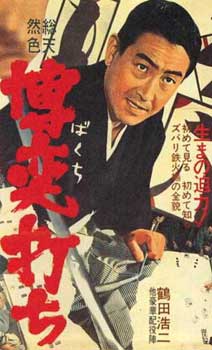

 As classic yakuza set-pieces unfold one after another, we learn that Boss Yajima, who has benefited greatly because of Koarashi's violent service five years earlier, has become an important mobster in league with a corrupt godfather named Kanai, head of all Kanto gamblers.
As classic yakuza set-pieces unfold one after another, we learn that Boss Yajima, who has benefited greatly because of Koarashi's violent service five years earlier, has become an important mobster in league with a corrupt godfather named Kanai, head of all Kanto gamblers. Koarashi believes in the gambling codes & has faith ins his superiors having a similiar devotion to the code. The rule is to protect the yakuza world from outside interference. The Ishi gang, construction workers, are ironically "decent citizens" according to the yakuza cold, with whom gamblers aren't supposed to interfer, & vice-versa. But Kanai secretly sides with the construction boss, using the highly formal reconciliation ceremony to sell out the Kido gang & give the district over to the Ishis.
Koarashi believes in the gambling codes & has faith ins his superiors having a similiar devotion to the code. The rule is to protect the yakuza world from outside interference. The Ishi gang, construction workers, are ironically "decent citizens" according to the yakuza cold, with whom gamblers aren't supposed to interfer, & vice-versa. But Kanai secretly sides with the construction boss, using the highly formal reconciliation ceremony to sell out the Kido gang & give the district over to the Ishis.